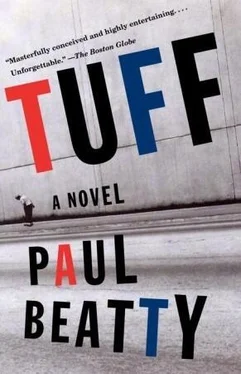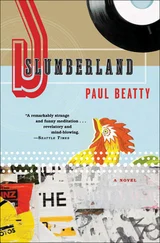It was through Moneybags’s curbside lessons in big business that Fariq had learned to decipher the stock pages, when to lowball a buyer, and if he were dumb enough to pay taxes, how to leap through the gaping loopholes. All Winston knew about the supposed oracle of commerce was that he didn’t dress as sharply as he had in the past. Moneybags made his early fortune selling milk-crate seating for a dollar a pop to overflow crowds during the legendary basketball tournaments held at Rucker and West Fourth Street parks each summer. Despite Fariq’s claims that Moneybags possessed infinite economic knowledge, Winston had never seen him offer any jewels of his wisdom other than the semiprecious baubles he’d snatched off the necks of groggy subway riders. Only once had he heard Moneybags engage in a coherent conversation. Two years ago, upon leaving a retrospective of Italian comedy at Lincoln Center, Winston spotted Moneybags’s showroom, a one-man open-air bazaar on the corner of Broadway and Sixty-sixth Street. Dealing in vacuum-wrapped electronics, Moneybags hopscotched over his smorgasbord of off-brand home phones, answering machines, and cassette decks to barter with the tourists. Winston was about to nod a covert hello when a potbellied black man pointed at a video camera box sealed in seamless cellophane. “How much?” the man asked, picking up the medium-sized carton, examining each side as if the sharpness of the corners conveyed something of the product therein. Moneybags smirked, answering the buyer sotto voce, “Crazy?”
“Naw, man, how much for the camcorder?”
“This merchandise ain’t for the brothers,” Moneybags said, grabbing the box from the man’s hands and placing it behind his back as if he were a suitor hiding a bouquet of roses, searching for an excuse to renege on an ugly blind date. The man backed off, a glint of understanding spreading across his face. “Your kindness is appreciated, brother.” Walking downtown, the portly man took one last look at Moneybags haggling with the bargain hunters. He guessed the tourists would be returning to Munich, Osaka, and Rome, arms laden with gifts: transistorless radios and red clay bricks wrapped in newsprint.
Government attempts to revitalize minority small business through free trade agreements and tax breaks had failed Moneybags. He was no longer a one-man electronics warehouse. The effects of trickle-down economics had reduced him to peddling ghetto bric-a-brac: stolen cheese, browning meats, and over-the-counter pharmaceuticals. It wasn’t uncommon for East Harlem residents to see Moneybags zigzagging across Lexington Avenue hawking a small bottle of red cough suppressant: “I got that Robitussin, baby. Got that Robitussin. Cough syrup. Cough syrup.”
Today it was flimsy wooden picture frames. Moneybags placed a heavy mahogany frame around his neck. He was preparing to leave. As he squared his shoulders toward Fariq, the sun silhouetted Moneybags’s dark profile against the partly cloudy sky. For a moment, the sickly sheen on his face and the graying mustache made him look like an oil portrait in the boardroom of a multinational corporation come to life. Moneybags excused himself. “I need to be going. Apparently none of you boys has any crack rock. But if I hear anything happening where you all might make some loot, I’ll let you know.” The proud CEO of nothing walked away from the stoop, steering a metal pushcart, one wobbly rear wheel alternately turning and sticking.
“I admire that motherfucker,” said Fariq. He shouted at the slouched back of the wiry tradesman, “Moneybags, stay up, God.”
“Why do you admire him?” Armello asked.
“Nigger could be out here selling drugs, doing something negative like the rest of us, but he’s down with the downtrodden, bottle hustling, redeeming aluminum cans and souls at the same time. Allah be praised. All praise due.”
“Fariq deep today,” commented Nadine.
Fariq began thumping on the magazine again. “This list is going to give us some ideas. This summer we ain’t fucking around, it’s time to build the foundation. Let’s get this money, hear me?”
Armello, sitting to Winston’s right, said, “Word is bond, son. What the first company on the list, yo? Bet money it’s a record company.”
Winston turned, threatening to smack Armello. Armello flinched. “Stop it, Tuff.”
“Record company — you thinking small, yo,” said Winston. “Niggers own bigger shit than a record company.”
“I know. I know. You right.”
Armello was the only member of the crew ever to have any of what they considered “real” money. As a high-school senior Armello was a twenty-year-old all-city shortstop and fourth-round draft choice of the Toronto Blue Jays. To boost his worth, Armello’s agent had him shave three years off his age and pretend he was a seventeen-year-old hurricane refugee who spoke no English and grew up on the dirt roads of Barahona playing ball with a chocolate milk carton for a baseball mitt. The ruse worked. The Blue Jays, thinking they’d found the next barefoot phenom, offered Armello one hundred thousand dollars to play minor-league baseball in Knoxville, Tennessee. Five years, four hundred ninety-two errors, a career batting average of.074, two hushed-up charges of statutory rape, and one very public conviction for battery of a third-base umpire later, all Armello had to show for the bonus money was a worthless laminated baseball card of himself, the lime-green Kawasaki Ninja parked a few feet away, and an overabundance of I’m-not-going-to-blow-my-next-opportunity determination. “I’m with you, Smush, we can do this. All we need to do is focus. Shit, I remember playing Chattanooga in late August, we were down two — one, bottom of the sixth, man on second, two out, I steps to the plate—”
“Strike three!” Yolanda yelled, jabbing a fist past Armello’s chest and pointing at an imaginary dugout somewhere near the El Tropical social club. “Armello, you ain’t giving no Hall of Fame speech, so shut the fuck up.”
While Armello sulked, Yolanda impatiently extended an upturned palm to Fariq and said, “Well, nigger, you got the floor, the steps, whatever.” Fariq looked over at Winston. “Damn, nigger, you need to check your girl.”
Winston shrugged. “What you waiting for, Smush, a drumroll? Get on with it.”
“The number-one black company in America is”—Fariq paused, locking eager eyes with the rest of the crew—“TLC Beatrice International Holdings.” The gang’s chests sank in a collective exhalation. Everyone had expected to hear the name of a familiar conglomerate: Texaco, Colgate-Palmolive, Zenith, Schlitz beer, thinking niggers must own something they’d heard of. Seeing the crew’s racial pride crash and burn, Fariq tried to swell their deflated egos. “The company is worth two billion dollars.”
“So,” snorted Yolanda. “Who ever heard of TLC Beatrice? What in hell do they make?”
Fariq explained, “TLC makes orange juice. They distribute groceries all over Europe, especially in France. International foods, supermarkets, know what I mean?” Fariq immediately realized he’d set himself up for ridicule by mentioning such a staid venture as the supermarket. He steadied himself for the inevitable pillory.
“What, nigger, you expect us to go to France to deliver and sell groceries all summer? This is going to make us rich?”
“Remember eggs and bread go on top.”
“Manager to register seven, I have an overring. I need the key. La llave, por favor .”
“Shit, none of us even speaks French.”
“Speak for yourself, nigger.” Yolanda said. She stood up, whipped her braids behind her back, and started singing the chorus from an old soul classic into her hairbrush. “ ‘Voulez-vous coucher avec moi ce soir.’ ”
Читать дальше












